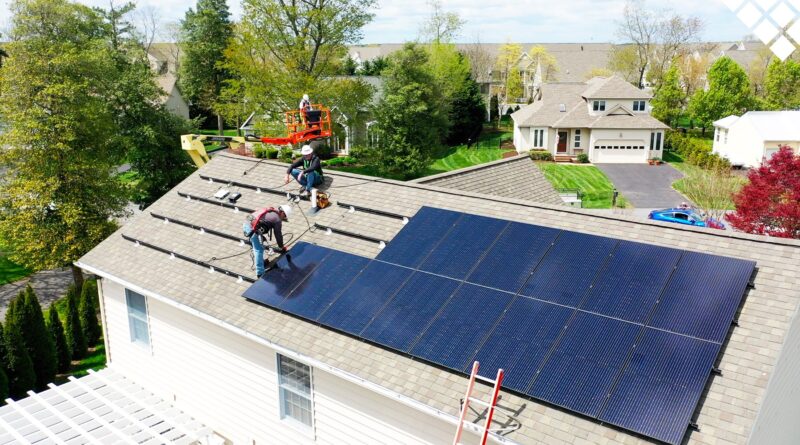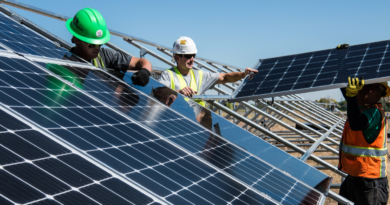Guide to Commercial Solar Panel Installation
In an era where sustainability and cost-efficiency are paramount for businesses, the installation of commercial solar panels has emerged as a game-changer. Solar power not only reduces your carbon footprint but also offers substantial long-term savings. In this comprehensive guide, we will explore the ins and outs of commercial solar panel installation, its benefits, and how it can elevate your business operations.
Understanding Commercial Solar Panels
Before delving into the installation process, let’s start with the basics. Commercial solar panels, also known as photovoltaic (PV) panels, are designed to capture sunlight and convert it into electricity. These panels consist of numerous solar cells that work together to harness the sun’s energy. In a commercial setting, solar panels are installed on rooftops, parking structures, or open land adjacent to the business premises.
Benefits of Commercial Solar Panel Installation
The decision to invest in commercial solar panels offers an array of advantages for businesses of all sizes and industries. Here are some key benefits:
- Cost Savings: By generating your electricity from the sun, you can significantly reduce or even eliminate your reliance on the grid, resulting in substantial cost savings on energy bills.
- Return on Investment (ROI): Commercial solar panel installations typically have a favorable ROI. Over time, the energy savings and potential incentives or tax benefits can outweigh the initial investment.
- Environmental Impact: Utilizing solar energy reduces your carbon footprint, helping your business contribute to a more sustainable future. It’s a powerful statement of your commitment to environmental responsibility.
- Energy Independence: Solar panels provide a degree of energy independence, reducing your vulnerability to fluctuations in energy prices and grid outages.
- Marketing and Branding: Going solar can enhance your company’s reputation, attracting environmentally conscious customers and investors.
Commercial Solar Panel Installation Process
Now, let’s walk through the essential steps involved in commercial solar panel installation:
- Site Assessment:
The process begins with a thorough assessment of your business premises. Solar experts will evaluate your location’s solar potential, considering factors like sun exposure, shading, and available space. This assessment helps determine the system’s size and placement.
- Design and Permitting:
Based on the site assessment, a custom solar system design is created. This design outlines the placement of panels, inverters, and wiring. Once the design is finalized, the project ejnters the permitting phase, where necessary approvals from local authorities are obtained.
- Equipment Procurement:
After receiving the necessary permits, the next sthep is procuring the solar panels, inverters, mounting hardware, and other required equipment. High-quality components are crucial for the system’s efficiency and longevity.
- Installation:
With all equipment on hand, the installation begins. Solar panels are securely mounted on the chosen location, often the rooftop. The installation team also sets up the inverters, wiring, and other essential components to ensnure the system functions optimally.
- Electrical Connections:
Connecting the solar panels to your business’s electrical system is a critical step. This involves integrating the solar system with your existing electrical infrastructure, ensuring seamless energy production and consumption.
- Testing and Commissioning:
Before the system is fully operational, rigorous testing and commissioning are performed. This includes checking for any wiring or equipment issues and ensuring that the solar panels are generating electricity as expected.
- Monitoring and Maintenance:
After installation, continuous monitoring of the solar system is essential to detect and address any performance issues promptly. Routine maintenance, such as cleaning the panels and inspecting electrical connections, helps maximize efficiency and longevity.
Financial Considerations
While commercial solar panel installation offers numerous benefits, it’s essential to consider the financial aspects of the project:
- Initial Investment: The cost of installing commercial solar panels can vary depending on the system’s size, location, and equipment. However, it’s with essential to view this as a long-term investment with the potential for significant savings and ROI.
- Incentives and Tax Benefits: Many governments and local authorities offer incentives and tax credits to businesses that invest in solar energy. These can significantly offset the upfront costs.
- Financing Options: Businesses can enxplore various financing options, including leases, power purchase agreements (PPAs), or loans, to make the initial investment more manageable.
- Energy Savings: Over time, the energy savings from solar power can outweigh the initial costs, resulting in substantial long-term savings.
- Maintenance Costs: While solar panels have minimal maintenance requirements, it’s essential to budget for occasional cleaning and routine inspections.
Choosing the Right Installation Partner
Selecting a reputable and experienced solar installation company is paramount to the success of your project. Here are some factors to consider when choosing a partner:
- Experience: Look for a company with a proven from track record of successful commercial installations.
- Reputation: Check reviews, references, and testimonials from previous clients to gauge the company’s reputation.
- Expertise: Ensure the company’s team includes certified solar professionals who understand the unique requirements of commercial installations.
- Customization: Your chosen partner should be willing to tailor the solar system to your specific business needs and objectives.
- Warranty and Support: Inquire about warranties on equipment and the company’s post-installation support and maintenance services.
Conclusion
Commercial solar panel installation is a strategic investment that offers a range of benefits, from cost savings to environmental responsibility. eBy harnessing the power of the sun, your business can reduce its reliance on traditional energy sources and make a positive impact on both its bottom line and the planet.
Strategic Investment:
Cost Savings: Commercial solar panels offer significant cost savings in the form of reduced energy bills. This can free up resources for other aspects of your business, ultimately improving your bottom line.
Environmental Responsibility: By transitioning to solar energy, your business can reduce its carbon footprint and demonstrate a commitment to environmental sustainability. This aligns with growing consumer and regulatory expectations for eco-friendly practices.
Planning and Assessment:
Site Assessment: Before proceeding with installation, conduct a thorough site assessment. Factors such as the available space, sunlight exposure, and any potential shading should be carefully evaluated to determine the optimal placement and capacity of solar panels.
Financial Implications: Understanding the financial implications of commercial solar installation is critical. Consider factors such as upfront costs, potential tax incentives or rebates, and the expected return on investment over the system’s lifespan. This financial analysis will help you make informed decisions.
If you’re considering commercial solar panel installation, take the time to assess your site, understand the financial implications, and choose a reliable installation partner. With careful planning and execution, your business can embark on a sustainable energy journey that powers it forward into a brighter, more eco-friendly future.



